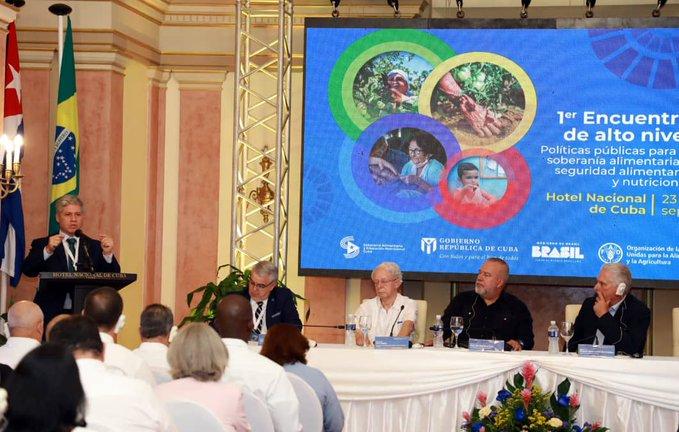
Member of the Political Bureau of the Party Central Committee and Prime Minister Manuel Marrero Cruz described the First High-Level Meeting on Public Policies for Food Sovereignty and Food and Nutrition Security as a space to strengthen regional cooperation and promote concrete commitments that contribute to achieving the sustainable development goals, particularly those related to eradicating hunger, reducing poverty, and building more equitable societies.
At the start of this meeting, which was attended by First Secretary of the Party Central Committee and President of the Republic Miguel Díaz-Canel Bermúdez, the Head of Government specified that the Law on Food Sovereignty and Food and Nutritional Security marked a milestone in the effort to transform the Cuban food system, which is based on producing the food necessary for family self-sufficiency in communities and municipalities, in order to reduce dependence on imports, primarily prioritizing the harvest of rice and other grains.
Paolo Teixeira, Brazil's Minister of Agrarian Development and Family Farming, reaffirmed his country's support for Cuba and reiterated its support for and firm condemnation of the U.S. blockade against the Island, as well as the erroneous inclusion of Cuba on the list of state sponsors of terrorism.
"Cuba is an international testament to sovereignty," said Brazilian theologian and friend of Cuba, Frei Betto, speaking at this first day of work. He also praised Brazilian President Luiz Inácio Lula da Silva's commitment to Cuba, which he defined as a "paradigm of a post-capitalist society" in Latin America.
Betto emphasized that the largest of the Antilles is the only country in the region whose political and legal structure guarantees the three fundamental human rights: food, health, and education, despite the challenges it faces stemming from U.S. blockade and internal challenges.
He recalled and expressed gratitude for the contribution of Cuban doctors to the Brazilian healthcare system, especially in rural and marginalized areas. "It would be great if more Cuban doctors returned to Brazil," he added.















